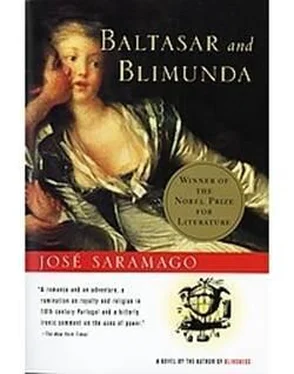José Saramago - Baltasar and Blimunda
Здесь есть возможность читать онлайн «José Saramago - Baltasar and Blimunda» весь текст электронной книги совершенно бесплатно (целиком полную версию без сокращений). В некоторых случаях можно слушать аудио, скачать через торрент в формате fb2 и присутствует краткое содержание. Жанр: Современная проза, на английском языке. Описание произведения, (предисловие) а так же отзывы посетителей доступны на портале библиотеки ЛибКат.
- Название:Baltasar and Blimunda
- Автор:
- Жанр:
- Год:неизвестен
- ISBN:нет данных
- Рейтинг книги:5 / 5. Голосов: 1
-
Избранное:Добавить в избранное
- Отзывы:
-
Ваша оценка:
- 100
- 1
- 2
- 3
- 4
- 5
Baltasar and Blimunda: краткое содержание, описание и аннотация
Предлагаем к чтению аннотацию, описание, краткое содержание или предисловие (зависит от того, что написал сам автор книги «Baltasar and Blimunda»). Если вы не нашли необходимую информацию о книге — напишите в комментариях, мы постараемся отыскать её.
Baltasar and Blimunda — читать онлайн бесплатно полную книгу (весь текст) целиком
Ниже представлен текст книги, разбитый по страницам. Система сохранения места последней прочитанной страницы, позволяет с удобством читать онлайн бесплатно книгу «Baltasar and Blimunda», без необходимости каждый раз заново искать на чём Вы остановились. Поставьте закладку, и сможете в любой момент перейти на страницу, на которой закончили чтение.
Интервал:
Закладка:
It was extremely moving to watch the mothers and daughters weep, the fathers put on a severe expression to disguise their true feelings, while the betrothed couples looked out of the corner of one eye to see whether they approved or disapproved of their partners but kept their thoughts to themselves. Gathered along the river-banks, the crowds saw nothing of the proceedings, but they relied on their own experiences and memories of their own wedding days to visualise the scene, in their mind's eye, they could see the respective parents embrace one another, the sly exchanges between the bridegrooms, and the affected blushes of the brides, now, now then, whether a man be king or commoner, there is nothing more enjoyable than a good fuck, ours is truly a nation of vulgarians.
The ceremony lasted a considerable time. The crowds gradually fell silent, as if by some miracle, the banners and standards scarcely moved in the breeze and all the soldiers turned their gaze towards the house on the bridge. The gentle strains of the sweetest music filled the air, a tinkling of tiny glass and silver bells, an arpeggio, which occasionally sounded hoarse, as if emotion was constricting the throat of harmony, What is that, a woman standing beside João Elvas inquired, and the old man replied, I'm not sure, but it could be someone playing for the pleasure of Their Sovereign Majesties and families, if my nobleman were here I should ask him, because he knows everything, after all, he is one of them. The music ends, everyone goes back where they belong, the River Caia flows quietly past, no shred of bunting remains, nor the tiniest echo of ruffling drums, and João Elvas will never know that he heard Domenico Scarlatti playing his harpsichord.
H EADING THE PROCESSION because of their enormous size, which makes it seem natural that they should have pride of place, are the statues of St Vincent and St Sebastian, both martyrs, although of the former's martyrdom there is no sign other than the symbolic palm, the rest being simply the emblems of his diaconate and the heraldic raven, whereas the other saint is characteristically represented in the nude, lashed to a tree, and with the perforations of those ghastly wounds from which the arrows have been prudently removed in case they should get broken during the journey. Immediately behind come the ladies, three virtuous beauties, and most beautiful of all St Isabel, the Queen of Hungary, then St Clare, and finally St Teresa, who was an extremely passionate woman consumed by spiritual ardour, at least that is what one assumes from her actions and words, and we could assume much more if we understood the souls of the saints. The saint right next to St Clare is St Francis, and this preference comes as no surprise, for they have known each other from their days in Assisi and now they have met up with each other again on the road to Pintéus, their friendship, or whatever it was that brought them together, would count for little if they were not to resume their dialogue at the point where they left off, as we were saying. If this is the most fitting place for St Francis, since of all the saints who are represented in this parade he has the most feminine of virtues, with that soft heart and cheerful disposition, equally well placed are St Dominic and St Ignatius, both Iberian and austere, subsequently demonic, if that does not offend the Demon, if it would not be just, in the end, to say that only a saint could have invented the Inquisition and another saint the spiritual formation of souls. It is evident to anyone familiar with these subtleties, that St Francis is under suspicion.
When it comes to sanctity, however, there is something for everyone. For those who prefer a saint who devotes his time to working the land and cultivating the written word, there is St Benedict. For those who prefer their saint to lead a life of austerity, wisdom, and mortification, bring forth St Bruno. For those who admire a saint of crusading zeal capable of reviving the missionary spirit, there is none to surpass St Bernard. The three saints are placed together, perhaps because they bear a striking resemblance to one another, perhaps because their combined virtues would make an honest man, or perhaps because the names of all three saints begin with the same letter of the alphabet, it is not uncommon for people to come together because of such coincidences, this could also explain why some people known to us, like Blimunda and Baltasar, should come together, and speaking of Baltasar, he is in charge of the yoke of oxen that is carrying the statue of St John of God, the only Portuguese saint among the confraternity that disembarked from Italy at Santo António do Tojal, and is heading for Mafra, like almost everyone else we have mentioned so far in this story.
Behind St John of God, whose house in Montemor was visited more than eighteen months ago by Dom João V when he accompanied the Princess to the frontier, although we omitted to say so earlier, which shows our lack of respect for national shrines, and may the saint forgive this omission, behind St John of God, as we were saying, come half a dozen more saints of lesser glory whose many laudable attributes and virtues we do not wish to disdain, but daily experience teaches us that unless assisted by fame in this world, one cannot achieve glory in heaven, a flagrant disparity to which all of these saints are subjected and who, because of their inferior status, have to be content with names like John of Matha, Francis of Paola, Cajetan, Felix of Valois, Peter Nolasco, Philip Neri, names that sound like those of ordinary men, but they cannot complain, for each saint has his own cart and is carefully transported horizontally, like the others with five stars on a soft bed of flock, wool, and sackfuls of husks, this prevents the folds in their robes from becoming creased or their ears from getting bent, for these marble statues are fragile, despite their solid appearance, and it takes only two knocks for Venus to lose her arms. We begin to lose our memory as we confuse Bruno, Benedict, and Bernard with Baltasar and Blimunda, and we forget Bartolomeu de Gusmão or Lourenço, whichever form you prefer, but who is never to be readily dismissed. For, as the saying truly goes, Woe to the man who dies, twice woe, unless there be some true or false sanctity to save him.
We have already passed Pintéus, and we are on our way to Fanhões with eighteen statues loaded on eighteen carts and the appropriate number of oxen, and a vast number of men handling the ropes, as already mentioned, but this expedition cannot be compared to the one that transported the Benediction stone, the stone for the balcony from where the Patriarch will give his blessing, these things can happen only once in a lifetime, and if human ingenuity did not invent means of rendering difficult things easy, it would have been preferable to leave the world in its primitive state. The people line the route to greet the procession as it passes, they are all surprised to see the saints lying down, and with good reason, for surely it would have been much nicer and more edifying to see the holy statues standing upright on the carts, as if they were on litters, then even the smallest of the statues, which are under three metres high, our own height, in fact, would have been seen from a distance, and you can imagine the impact of the two statues in front, St Vincent and St Sebastian, which are almost five metres high, two mighty giants, two Christian Hercules and champions of the faith, looking down from their great height over the terraces and crests of the olive groves at the vast world, for them this would truly be a religion comparable with those of ancient Rome and Greece. The procession came to a halt in Fanhões because the local inhabitants insisted upon knowing, name by name, who the various saints were, for it was not every day that they received, even if only in transit, visitors of such corporeal and spiritual stature, the daily transport of building materials is one thing, but quite another was the sight witnessed several weeks ago, when an interminable convoy of bells went past, over a hundred of which will ring out from the bell towers of Mafra, the imperishable memory of these events, and yet another is this sacred pantheon. The local parish priest was summoned to identify the saints, but his answers were not entirely satisfactory, because not all of the statues had the saint's name clearly inscribed on the pedestal, and in many instances the name was all the parish priest could provide, it is one thing to recognise immediately that this is St Sebastian and quite another to recite from memory, Beloved brethren, the saint you see here is St Felix of Valois, who was a disciple of St Bernard, who is up there in front, and who established, together with St John of Matha who is at the back there, the Order of Trinitarians, which was founded to rescue slaves from the clutches of the infidels, just think of the edifying tales that help strengthen our holy faith, Ha ha ha, laugh the inhabitants of Fanhûes, And when will orders be given to rescue slaves from the clutches of the faithful, Reverend Prior.
Читать дальшеИнтервал:
Закладка:
Похожие книги на «Baltasar and Blimunda»
Представляем Вашему вниманию похожие книги на «Baltasar and Blimunda» списком для выбора. Мы отобрали схожую по названию и смыслу литературу в надежде предоставить читателям больше вариантов отыскать новые, интересные, ещё непрочитанные произведения.
Обсуждение, отзывы о книге «Baltasar and Blimunda» и просто собственные мнения читателей. Оставьте ваши комментарии, напишите, что Вы думаете о произведении, его смысле или главных героях. Укажите что конкретно понравилось, а что нет, и почему Вы так считаете.












